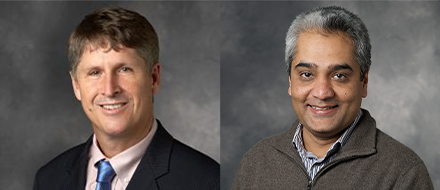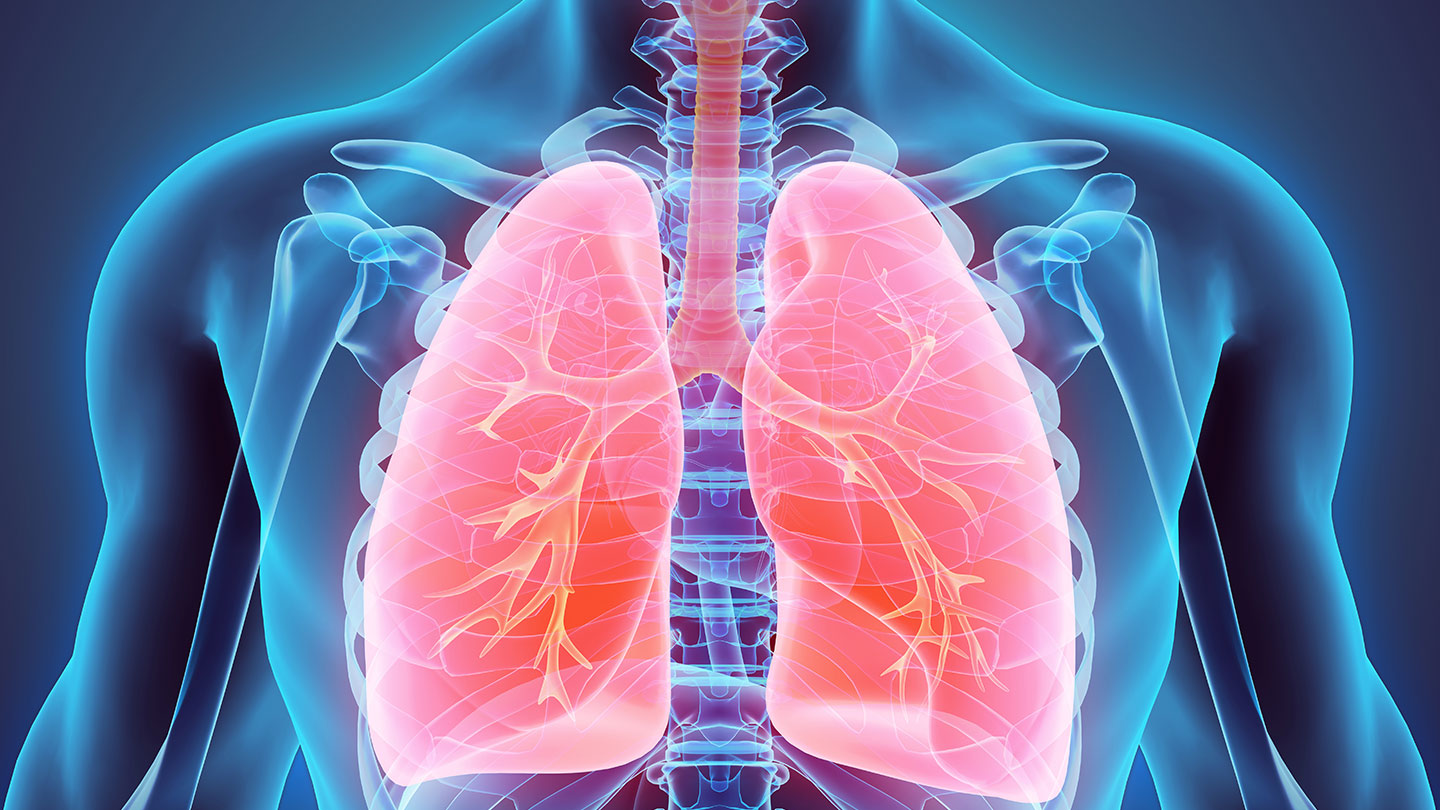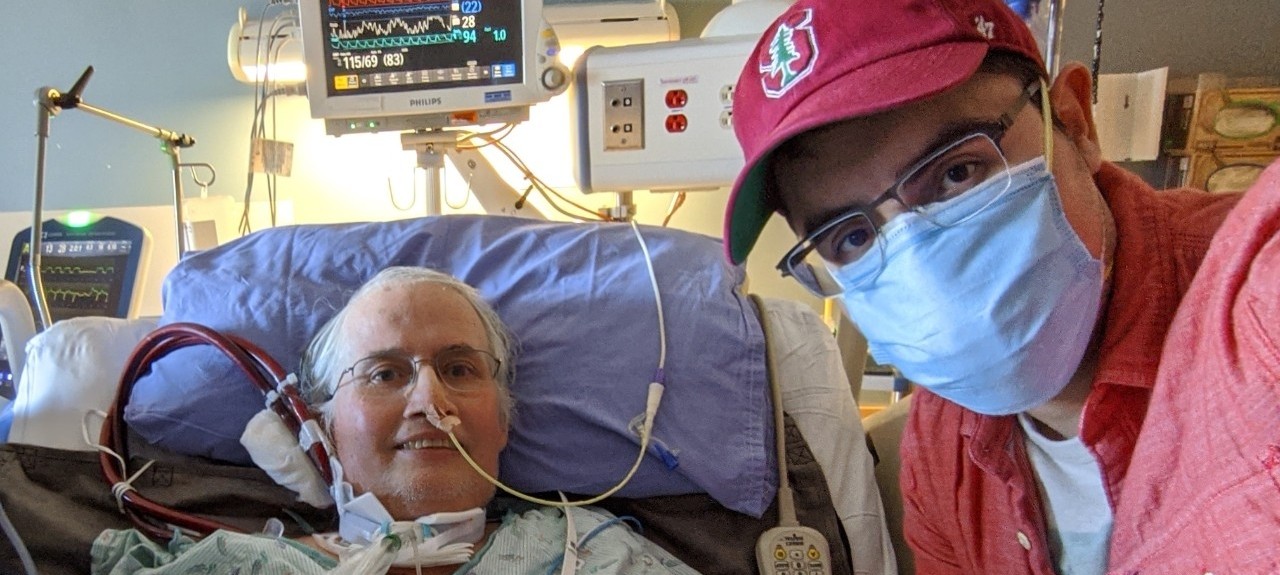What We Offer You for Lung Transplantation
- Specialized expertise in lung transplants, lung rescue, and pre- and post-transplant care for people with advanced lung diseases, including chronic obstructive pulmonary disease (COPD), cystic fibrosis, pulmonary hypertension, and interstitial lung disease. Go to Conditions Treated
- National recognition for exceptional lung care, including our cystic fibrosis, pulmonary vascular disease, pulmonary hypertension, and interstitial lung disease programs in our Center for Advanced Lung Disease
- Advanced treatment options including minimally invasive approaches to lung transplant, multiorgan transplant, double lung transplant, and lung rescue treatment. Go to Treatments
- Team-based approach to treatment planning, bringing together transplant specialists in pulmonology, chest surgery, nursing, and other fields to tailor care to your needs. Go to Your Care Team
- Clinical trials that provide access to promising lung transplant treatments before they’re widely available. Go to Clinical Trials
- Comprehensive support services to help you and your family focus on health and healing. Go to Support Services
- Ease of access to complete lung transplantation care, with patient coordinators to guide you through the process and help with lodging, travel, and other needs during your stay. Go to Connecting to Care
Conditions Treated
The lung transplant specialists at Stanford Health Care treat people with all types of advanced lung disease. Depending on your condition, you may be taking medication or using supplemental oxygen to improve breathing and manage other symptoms. If your condition worsens and these treatments no longer help, you may need a lung transplant.
Chronic lung diseases and other conditions that may require a lung transplant include:
- Alpha-1 antitrypsin deficiency (an inherited condition that increases your risk of diseases in your lungs, liver, and other organs)
- Chronic obstructive pulmonary disease (COPD) including emphysema and chronic bronchitis
- Congenital heart diseases that affect the lungs, such as Eisenmenger syndrome
- Cystic fibrosis
- Interstitial lung disease, including pulmonary fibrosis
- Lymphangioleiomyomatosis
- Pulmonary hypertension (high blood pressure in lung arteries)
- Sarcoidosis (severe inflammation with lumps of immune cells that form in the lungs)
- Severe bronchiectasis (damaged, thickened lung airways that cause mucus buildup)
Lung Transplant Treatments
Stanford Health Care has long been at the forefront of lung transplant research and care, providing hope for people with end-stage lung disease. Our pulmonologists, transplant surgeons, and other team members help people with complex conditions who have been told they can’t be treated. You receive the most advanced treatments available today, from expert specialists with years of experience.
PROGRAM HIGHLIGHTS
Stanford Health Care’s contributions to lung disease treatment continue to advance the standard of care for people who need lung transplants. Highlights include:
- The world’s first successful heart-lung transplant in 1981
- One of the most active lung transplant programs in the U.S., performing about 50 to 60 transplantations per year
- One of the largest heart-lung transplant programs in the Bay Area
- Only Bay Area gold-level ELSO-designated Center of Excellence for extracorporeal membrane oxygenation (ECMO) for adults
- Ability to perform complex and high-risk lung transplants for people who have been turned away from other transplant centers
- One of the first to perform lung transplants in patients after COVID-19 infection, including the first lung and kidney multiorgan transplant.
Stanford Health Care has highly successful lung transplant outcomes, exceeding the national average for lung transplant survival rates.
Lung Transplant Process
Before a lung transplant, we do a comprehensive evaluation, including tests to understand your overall health. This process helps us identify and address any issues that could arise after lung transplant surgery.
Based on your specific health, you may need one or more tests, which include:
- Blood tests to check for signs of infections or other conditions
- Blood and tissue typing to help with donor matching and prevent organ rejection
- Imaging, such as a chest CT scan or chest X-ray
- Dental checkup to take care of any problems that could lead to infection and organ rejection after transplant
- Heart tests, such as:
- Cardiac catheterization
- Echocardiogram (echo)
- Electrocardiogram (EKG or ECG)
- Psychosocial evaluation to identify and address issues that affect transplantation and recovery, such as family support, financial resources, and stress
- Pulmonary function tests
- Age-appropriate health screening
Tests also help us monitor your health while you’re waiting for a donor organ. Your time on the lung transplant waiting list depends on many factors, which your doctor will explain. Learn more about what to expect before a lung transplant.
Depending on your overall health and symptoms, you may need pre-transplant care to stay as healthy as possible while you’re on the organ waitlist. In addition to medications and supplemental oxygen therapy, we also offer lung rescue therapy.
Lung rescue therapy
Extracorporeal membrane oxygenation (ECMO) provides lifesaving treatment for people with respiratory failure due to advanced lung disease or other causes. The Extracorporeal Life Support Organization (ELSO) has designated Stanford Health Care’s lung rescue program as a Gold Level Center of Excellence in life support. This award recognizes our commitment to the highest standards of care in ECMO and other lung therapies.
ECMO is a machine that temporarily takes over your lung function to remove carbon dioxide and replace oxygen in your blood. Our pulmonologists and their teams use ECMO as a bridge to:
- Lung transplant
- Heart failure treatment, such as a heart transplant or left ventricular assist device (LVAD)
- Treatment for lung diseases such as pulmonary embolism or severe lung infection
When a donor lung or lungs become available for you, you must come to our hospital within a few hours. Our team guides you through the process for lung transplant surgery, keeping you informed at every step. Find out what to expect during the surgery.
Lung transplant procedures
Lung transplants provide healthy lungs from a deceased donor to replace damaged lungs in people with severe lung disease and lung failure.
At Stanford Health Care, our skilled transplant surgeons perform several types of procedures for lung transplant:
- Single-lung transplant
- Double-lung transplant
- Multiorgan transplants, including heart-lung, lung-kidney, and lung-liver transplants
Ex vivo lung perfusion (EVLP)
Our lung transplant team uses ex vivo lung perfusion (EVLP) to transport donor lungs in a warm, living, breathing state. The EVLP device pumps blood through the lungs’ blood vessels and oxygen through the lobes to keep the donor lungs healthy.
With EVLP, we can expand the pool of donor lungs, providing access to transplants for more people on the waiting list. The technology has important benefits over traditional cold storage for donor lungs because it allows for:
- Transporting organs greater distances: EVLP keeps donor lungs functional for up to 20 hours as opposed to six hours with cold storage, making organ donations that would have previously been impossible now feasible and increasing the overall number of transplants.
- Improving the condition of donor lungs: The device circulates blood and oxygen through the lungs, which helps repair tissue injury that can occur with the donor’s death.
- Evaluating donor lungs: EVLP allows the transplant team to evaluate donor lungs more thoroughly to assess viability. This improves the likelihood that a recipient's body will accept the donor lungs.
After lung transplant surgery, you stay in our ICU for about three days with a total hospital stay of two to three weeks. Your recovery time at home depends on your overall health and previous lung condition. Learn more about what happens after surgery.
Your first follow-up appointment happens about three weeks after your discharge from the hospital. You'll need lifelong follow-up care with our lung transplant team to monitor you for signs of infection or organ rejection and to see how well your lungs are working. Your follow-up appointments may include:
- Pulmonary function testing
- Lung imaging
- Lab tests
- Management of medications to prevent organ rejection
Excellence in Lung Transplant Quality and Survival
Stanford Health Care’s Lung Transplant Program is nationally recognized for its excellent quality and success rates for lung transplantation. The transplant program exceeds the national average for survival after lung transplantation (according to the Scientific Registry of Transplant Recipients). You will benefit from:
- Faster lung transplantation: Stanford Health Care’s program allows for a lung transplant sooner as our program has a higher lung acceptance rate compared to the national average. Accepting more organs means we can provide faster access to transplants and lessen the wait times.1
- Excellent survival rates: Lung transplantation survival rates at Stanford Health Care are better than the national average for one year after transplantation.
|
1
|
1
Stanford Health Care Rates |
1
National Average Rates |
|---|---|---|
|
1
Patient 1-year survival post-transplant |
1
89.92%1 |
1
88.72%1 |
|
1
Graft (lung) 1-year survival post-transplant |
1
90.33%1 |
1
88.14%1 |
The above results speak to the consistency and thoroughness with which we care for patients over time. 1 To learn more about statistics related to lung transplantation, visit the Scientific Registry of Transplant Recipients.
- A heart-lung transplant program that continues to transplant the highest number of heart-lung transplants in the nation. The program’s 1-year patient survival rate and graft (heart-lung) outcomes are better than the national average.1
|
1
|
1
Stanford Health Care Rates |
1
National Average Rates |
|---|---|---|
|
1
Patient 1-year survival post-transplant |
1
87.41%2 |
1
81.37%2 |
|
1
Graft (heart-lung) 1-year survival post-transplant |
1
84.18%2 |
1
80.55%2 |
Clinical Trials
Clinical trials are research studies that evaluate a new medical approach, device, drug, or other treatment. As a Stanford Health Care patient, you may be eligible to participate in open clinical trials to evaluate new breakthroughs.
Open trials refer to studies currently recruiting participants or that may recruit participants in the near future. Closed trials are not currently enrolling, but similar studies may open in the future.
Your lung transplant team includes pulmonologists (lung doctors) with years of experience diagnosing and treating all types of lung diseases. Our team brings together specialists from transplant surgery, thoracic (chest) surgery, infectious disease, and other fields of medicine. Together, we carefully evaluate you and recommend treatment options—including heart-lung and double-lung transplants—tailored to your needs.
Our multidisciplinary lung transplant team specializes in exceptional care, education, and support for people with advanced lung disease. The extended care team includes specially trained nurses, transplant coordinators, and other providers who support and guide you through the transplant process. We update your referring physician about your status during treatment at Stanford Health Care and transition your care back to them afterward.
Your Doctors
Pulmonologists
Pulmonologists specialize in managing lung function and diagnosing and treating lung diseases. Pulmonologists help manage your care before and after the transplantation surgery.
View All {0} Pulmonologists »Lung Transplant Surgeons
Transplant surgeons are doctors who specialize in organ transplantation. They oversee all team members and perform the transplant surgery. The transplant surgeon helps manage your care before and after the transplant procedure, including follow-up.
View All {0} Lung Transplant Surgeons »Infectious Disease Specialists
Infectious disease specialists are doctors who diagnose, treat, and help prevent diseases caused by bacteria, viruses, fungi, and parasites. People who receive organ transplants must take medications that suppress the immune system (immunosuppressants) to help prevent organ rejection. Immunosuppressants increase your risk of developing infections, and an infectious disease specialist helps minimize that risk.
View All {0} Infectious Disease Doctors »Psychiatrists
Our psychologists are an integral component of our program. They specialize in behavioral health and the psychological effects of disease, so they can detect psychological and behavioral factors that can contribute to your condition. They also help you cope with symptoms through mindfulness techniques and stress-reduction exercises.
View All {0} Psychiatrists »Advanced Practice Providers
Advanced practice providers include nurse practitioners and physician assistants. They work with transplant surgeons and pulmonologists to manage your care before and after transplant.
View All 5 Advanced Practice Providers »Extended Care Team
Pre-Transplant Nurse Coordinators
Pre-transplant nurse coordinators manage your evaluation process once you are referred to us for organ transplantation. They help you understand the physical and psychosocial implications of a transplant. They also obtain your medical history and testing from your doctors, and inform you about upcoming appointments and tests. They monitor your health while you are on the organ waitlist before transplant surgery.
Post-Transplant Nurse Coordinators
Post-transplant nurse coordinators organize all aspects of your care after your transplant. Before you leave the hospital, they provide you with the education you need to have a successful post-transplant course. They manage your outpatient care when you come to the clinic and are your primary contact for your post-transplant needs.
Transplant Social Workers
Transplant social workers conduct a psychosocial evaluation as part of the evaluation process for transplant candidacy. The evaluation includes assessment of ability to cope during stressful times, available support system and emotional readiness for transplant. Social workers also provide support to your family and help your family deal with many issues that may arise including lodging and transportation, finances, and legal issues.
Registered Dietitians
Registered dietitians work closely with you and your family to help you meet your nutritional needs before and after the transplant. They help you learn about a nutritious diet to speed your recovery and maintain lifelong health.
Transplant Pharmacists
As member of a multidisciplinary team, the transplant pharmacist makes rounds with the transplant team and offers services such as therapeutic drug monitoring and providing drug information about potential side effects and drug interactions. The pharmacist, alongside other transplant team members, helps to counsel transplant recipients on their individualized drug regimens.
Inpatient Case Manager
Inpatient case managers assist patients and their families with discharge planning and insurance issues.
Support Services
We offer a vast array of support services to help you feel your best throughout your care, from diagnosis through treatment and recovery.
- Integrative Medicine (acupuncture, massage)
- Interpreter Services
- Spiritual Care
Our lung transplant team sees you in one of three convenient locations: on Stanford Health Care's main campus or at one of our outreach clinics in Northern California or Nevada. You can access nationally renowned care and Stanford Medicine expertise—from diagnostic evaluation to treatment to follow-up care—close to you.
For Referring Physicians
PHYSICIAN HELPLINE
Fax: 650-320-9443
Monday–Friday, 8 a.m.–5 p.m.
Stanford Health Care provides comprehensive services to refer and track patients, as well as the latest information and news for physicians and office staff. For help with all referral needs and questions, visit Referral Information.
You may also submit a web referral or complete a referral form and fax it to 650-320-9443 or email the Referral Center at ReferralCenter@stanfordhealthcare.org.
1 “Lung, Stanford Health Care,” Scientific Registry of Transplant Recipients, accessed January 10, 2024.
2 “Heart-Lung, Stanford Health Care,” Scientific Registry of Transplant Recipients, accessed January 10, 2024.





